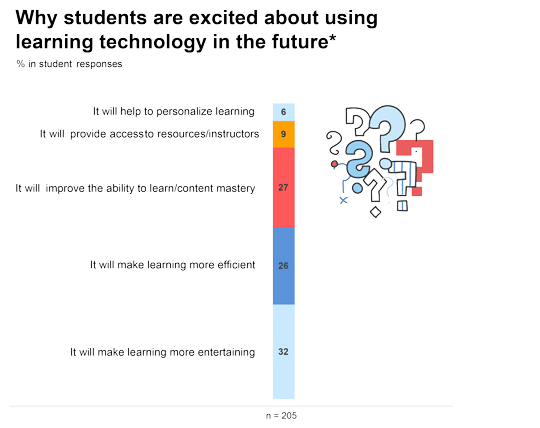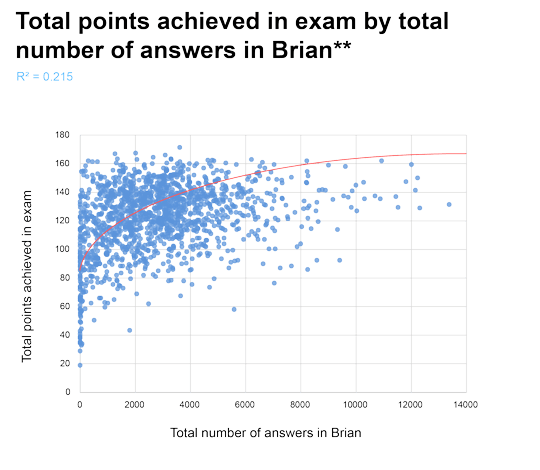Wissenschaftliche Studie
Wie die Universität St. Gallen mit Brian Studierende motiviert und Lernerfolge verbessert.
KontaktDie Herausforderung
Studierende fordern unterhaltsame und effiziente Lernwerkzeuge (Quelle: McKinsey*). Da die LMS-Systeme der Universitäten ihre Erwartungen nicht erfüllen, wenden sie sich an moderne, ansprechende Lernlösungen ausserhalb der universitären Bildungsinfrastruktur, wie Anki, Studysmarter oder Quizlet.

*Brasca, C., Marya, V., Krishnan, C., Owen, K., Sirois, J. und Ziade, S., 2022. How technology is shaping learning in higher education. McKinsey.com.
Das Teaching Innovation Lab der Universität St. Gallen hat diesen Trend frühzeitig erkannt und sich für eine Partnerschaft mit Brian entschieden, um eine ansprechende und effektive Lernlösung für ihre Studierenden zu implementieren.
Der Aufbau
Im Herbst 2021 startete die Universität St. Gallen ein Pilotprojekt, um die Auswirkungen von Brian auf die Leistung der Studierenden zu evaluieren.
Die Universität St. Gallen (HSG) ist eine öffentliche Universität in der Schweiz. Sie wird von der Financial Times als eine der besten Wirtschaftsuniversitäten in Europa eingestuft. Sie ist Mitglied der CEMS und der APSIA und ist EQUIS-, AACSB- und AMBA-akkreditiert (triple crown).
Das Pilotprojekt wurde vom Team des ehemaligen Rektors der Universität St. Gallen, Professor Thomas Bieger, betreut und in seinem Studiengang "Business Administration" durchgeführt, in dem jedes Jahr etwa 1500 Studierende eingeschrieben sind.
Das Ergebnis
Innerhalb von 5 Monaten beantworteten 1423 Studierende 3'421'383 Fragen auf der Lernplattform Brian. Mehr als 95% aller in der Lehrveranstaltung eingeschriebenen Studierenden nutzten Brian, obwohl die Nutzung weder vorgeschrieben war noch benotet wurde.
> 95%
Adoptionsrate der Studierenden

2400
Beantwortete Fragen pro Student*in

3,000,000
beantwortete Quizfragen in einem Semester

In der offiziellen Kursbewertung gaben die Studierenden an, dass Brian wesentlich zu ihrem Lernerfolg beitrug («Top of Mind»).
 Offizielle Kursbewertung
Offizielle Kursbewertung
Was hat wesentlich zum Lernerfolg beigetragen?
- "Brian"
- "v.a. die Lernapp Brian"
- "Lernapp Brian, genial und macht Spass!"
- "Brian ist sehr hilfreich um Sachen zu repetieren."
- "Brian (App) ist wirklich hilfreich, um zu üben."
- …
Brians spielerische Elemente wie die Ranglistenfunktion und der Mehrspielermodus erfüllten ihren Zweck: Sie schufen eine motivierende Lernumgebung, die die Studierenden freiwillig zur Vorbereitung auf die Prüfung nutzten.
Die wichtigen Nutzungsdaten und das ermutigende qualitative Feedback führten dazu, dass Brian in weiteren Lehrveranstaltungen an der Universität St. Gallen eingesetzt wurde. Brian ist nun an der gesamten Universität verfügbar und wird in einer Vielzahl von Fächern eingesetzt, darunter Wirtschaftswissenschaften, Russisch, Finanzen, Betriebswirtschaftslehre, Rechtswissenschaften, usw.
Verbesserung von Lernergebnissen
In einer separaten, laufenden Studie wird der Einfluss von Brian auf die Lernergebnisse der Studierenden untersucht. Um dies zu erleichtern, werden die von Brian gesammelten anonymen Nutzungsdaten den Forschenden zur Verfügung gestellt, die diese Daten dann mit den Prüfungsergebnissen vergleichen.
Die Niveaulogarithmus-Regressionsanalyse zeigt, dass die Anzahl der in Brian beantworteten Fragen einen positiven Einfluss auf die in der Prüfung erreichte Punktzahl hat (F(1,1439) = 394.908, p < .001). 21,5% (bereinigtes R²) der Varianz der Prüfungspunkte werden durch den natürlichen Logarithmus der Anzahl der beantworteten Fragen in Brian erklärt, was nach Cohen (1992) einem starken Effekt entspricht (f = 0,523).**
Kurz gesagt, Studierende, die mit Brian lernen, erzielen bessere Ergebnisse als ihre Mitstudierenden.

** Die Studie steht kurz vor dem Abschluss. Wir verlinken die Publikation, sobald sie verfügbar ist.
